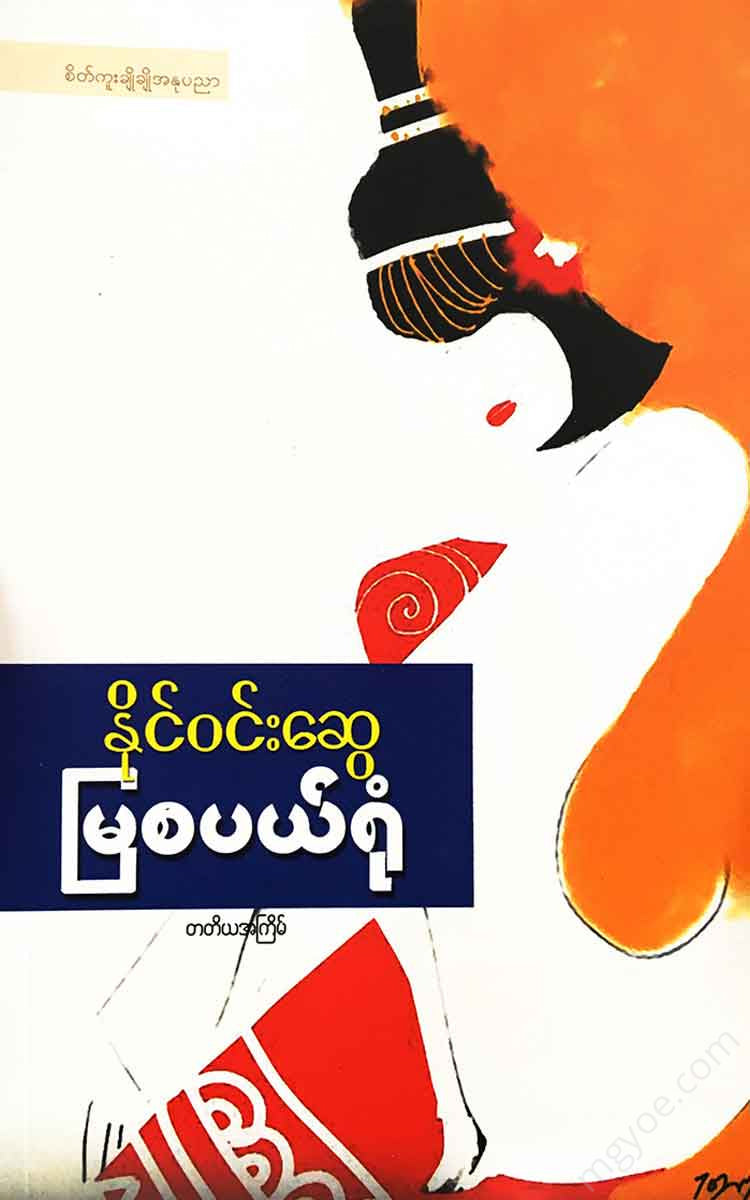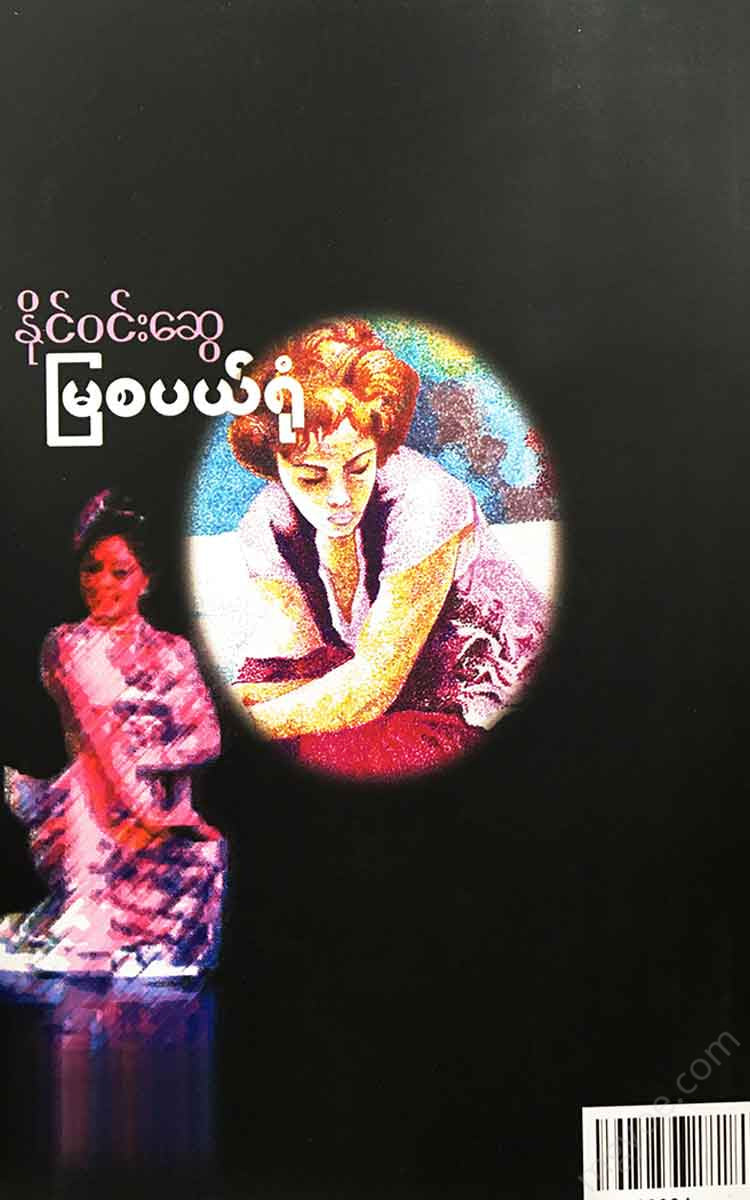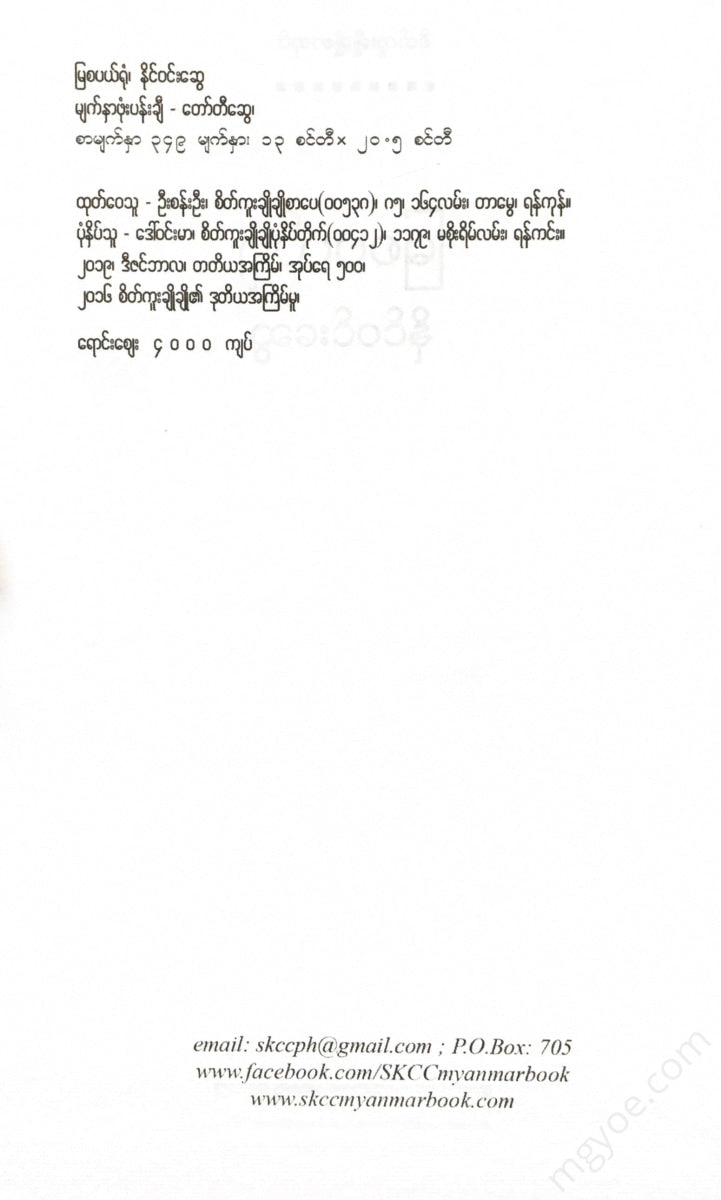စိတ်ကူးချိုချိုစာပေ
Nai Win Swe - Myasa Pae Yoon
Nai Win Swe - Myasa Pae Yoon
Couldn't load pickup availability
The teacher came down from the high bench next to the painting, stepped back a little, and looked back at the painting.
The stage is far away. The rough brush strokes on the painting make the forest silhouettes stand out from the distance. The eastern part of the painting shows deciduous trees in the forest, whose trunks are stable due to the wave of aging, trees with yellow leaves, trees with yellow and green leaves and buds, trees with green leaves, and trees with various heights and heights. Behind the forest silhouette, a rocky mountain with a waterfall flowing is calm.
The teacher intended this painting to be used as a theme painting in his Wunnapaba, Nagaryon, Myatpanwutthon, and Kathemalay, Asaung. In Myatpanwutthon, this painting will become a main character. In the dance drama “Ngwe Taung Pyi”, the forest shadows of this painting will be covered with the shadows of the mountains and the birds will fly and move.
The artist imagined the magical sky above the mountain at the top of the painting. In his imagination, he saw “the formless Garuda, the beautiful form of the Garuda.” It could be imagined and reflected in the brushstrokes. On the brushstrokes...
“The clouds and mists drift by, Are they pure gold or silver? The train of silver-like things, Are they seen or seen, Are they scattered here and there? Then, in the brief abode of the beauty of the twilight, I cling to them and gaze, And my heart rejoices in the joy of the sun,
Colorful and thought-provoking, don't be happy, oh, my dear..... If you give me a sound, if I accidentally become more beautiful, will I cry or laugh.... Oh, the sea or the rain, I think wrongly, I see wrongly, while playing with the mind's confusion - Maya painting corrects it"
A fragment of the song "Maya Tham" that he had written came to mind. The teacher began to hum his song to himself. His soft, flowing voice seemed to spread towards the painting, filling it with new life.
He searches for areas to fill in and areas to remove in his imagination.
After a while, he stopped singing and walked back to the shade of the vanda tree where the painting was hung.
Standing on a high platform, he took the brush and filled in the details. The teacher's mind was in a hurry. This painting was the last painting for the Anu Thabang. The newly formed Anu Thabang would be performing in the next few days.
The rain had long since left the new town and flown into the sky. The teacher was very tired because he had to draw the stage paintings day after day. He was already tired for several days before the first performance of the play.
Last year, the owner of the Anu Thabin caste was Thet Khaing. The teacher left his job and set up Anu Thabin with him. The teacher and U Thet Khaing are as similar as red and yellow, but they are opposites. When red and yellow are combined, a new color (orange) is produced. The teacher wants to use his own quality. Then the caste has to separate from the complex.
The play has overcome various difficulties over the course of a year. As it has passed, the weak parts of the play have fallen away one by one. Hla Kyi Kyi Lay, Sein Win Shwe, Padumma Kyi Kyi, Kyi San Kyi, Ngwe Sandar Tin Aung, U Thet Khaing (the actor), Kyaw Mya Lay (the comedian). They were weak parts of the play and fell away.
When the new organization was formed, Aung Myint Sein was used instead of Sein Win Shwe as the leader. Toe Ma Lay was appointed as the leader. Shwe Mann Thu Kyi Kyi was replaced by Padum Ma Kyi Kyi Kyi. Maung Thaung Lay was replaced by Ngwe Sandar Tin Aung. Sein Ohn Kyi was promoted to Hla Kyi Kyi Kyi Lay. The old ones were replaced by new ones in the ceremony and the teacher himself reestablished the organization.
The teacher sold the house and yard he had inherited from his grandfather and used the money for the funeral. He bought a small plot of land and a small house in a low-lying area for a very cheap price, and from there he built a strong foundation for the funeral.
Since moving from Aye Yeik Nyein, I have never been to Aye Yeik Nyein. The teacher does not want to see Aye Yeik Nyein anymore. My grandfather has lived in Aye Yeik Nyein since he was a child. My father was also born in Aye Yeik Nyein. My grandfather was quite wealthy. He wanted to help my father (U Phu Khaung) in his business. My father played the harp, painted, and wrote plays since he was a child, and he followed a puppet troupe. Then he met my mother (Sa Pae Yoon) and they became like-minded (Sa Pae Yoon Ain Ein).
They formed a large group and traveled along the Irrawaddy River, traveling in a northerly direction.
I was born in a small town on the banks of the Ayeyarwady River, where the Sapae Yon Ayeint Group temporarily stopped. I had to accompany the Ayeint Group until I was about ten years old. At that time, Daw Sapae Tin was just a young dancer. My mother Yin (Sapae Yin) was already a talented actress who was my mother's assistant. When I think back on the Sapae Yon Ayeint Group, I miss my father, my mother, Sapae Yin, and Sapae Tin.
The teacher used to sit in my father's lap and play the piano. I remember him playing the piano,
“You will realize their value later, my son. The whole of Burmese music is filled with the truth. The truth is the main thing, you will realize it later.”
The teacher only tried to teach me two songs on the harp. My father was married and did not teach me, but my father's harp was familiar to my ears, so I had already learned by ear.
When my mother started teaching me the basic yoga poses, I was not even five years old. I had to sit cross-legged, my chest arched, and my hands on my thighs for days, which seemed to be a long time. Then I started lifting my hands up and down, and then my head. Then I slowly got up from my seat. Then I started doing the dance moves.
At that time, the teacher had to sleep with the assistant princess of the mother, the mother. When he ate, he would also eat with her, and sometimes he would secretly bring something to her and ask her to taste it. She would show him a piece of bread and give it to him. Whenever the teacher wanted to eat a piece of bread, he would laugh heartily when he tasted it. He would smile very happily. When he smiled, a cute baby tooth would appear.
"Son, you are my mother's son, now... call me mom..."
"Mom" "Wow...wow, your son is very clever."
At that time, Mother Yin was a virgin. Now, remembering that the teacher was the son of a virgin Mother Yin, I smile.
When the last episode ended, the teacher was in a state of shock and death, and his father and mother died one after the other in Nyaung Oo. The teacher was crying day and night. The teacher had no blood relatives, but the only comfort he had was broken into pieces and the story ended. The teacher cried uncontrollably in his mother's arms. He had no one to rely on except for her. Recently, his grandfather, who had never seen him before, came to call him. When he saw the teacher crying and playing the pattala...
"Ha... here comes another one, this is a little Pukkhaung, a little one who will die like a dog, like a stray dog, "Pukkhaung, Pukkhaung..." I remember him saying in a whisper.
The teacher cried as she had to leave her mother behind. She had to board a large ship with her grandfather on the upper deck.
When he arrived in the new town and settled down in the quiet, his life changed completely. He became a disciplined student who went to school every day. Since his father taught, he started in the second grade, but he did not grow up. He easily passed each grade and went to university. When he was away from his grandfather, his original sense of humor suddenly and freely awakened. He took up the harp and studied dance. He participated in school dances.
"You...you're back to being a glutton..." the old man scolded, and the teacher laughed. "Good, you glutton, you misbehaving, you're still going to be a glutton, you're a glutton, you're still going to be a glutton, you little glutton."
In later years, my grandfather's farmlands became unusable and the economy declined. I had to leave school and work as a high school teacher at Myothit Myo No. 1 High School when my grandfather passed away. He left behind only a plot of land, a small house, and a few small coins.
The teacher imagined his life as a teacher as a peaceful painting. When he encountered school dances, his sense of humor would be aroused. Later, he spontaneously became a songwriter, dance teacher, and drama teacher at school dances.
Earning a salary at a restaurant, going to school, reading, dancing at school, painting, and writing poetry.
In the quiet living room, three large paintings that my father had last painted were hung. I cherished these three paintings as my father's legacy. In the three large paintings of my mother, my mother Yin, and Daw Sap Tin, you can see my father's thoughts, imaginations, and feelings.
My father's words are bold. They are strong. They are firm.
In the painting, my mother's eyes are filled with tears. It's as if I can see my father's enduring love in my mother's painting. My father's love is so deep.
My mother was dancing and smiling. Her smile was bright and fresh. Her baby teeth were showing.
Daw Sap Tinkar on her broken fingers





